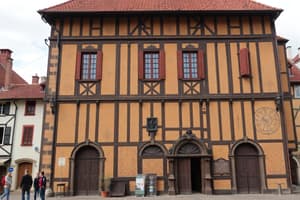Podcast
Questions and Answers
The study of past events, societies, and cultures is known as Economics.
The study of past events, societies, and cultures is known as Economics.
True (A)
Political history focuses on social structures and interactions among people.
Political history focuses on social structures and interactions among people.
False (B)
The Medieval Period spans from 500 AD to 1500 AD.
The Medieval Period spans from 500 AD to 1500 AD.
True (A)
Julius Caesar was the last pharaoh of Ancient Egypt.
Julius Caesar was the last pharaoh of Ancient Egypt.
The Modern History period is defined as the time from 1700 AD to the present.
The Modern History period is defined as the time from 1700 AD to the present.
Primary sources are analyses and interpretations of past events.
Primary sources are analyses and interpretations of past events.
Genghis Khan was the founder of the Roman Empire.
Genghis Khan was the founder of the Roman Empire.
Social history has seen an increased focus on marginalized voices in recent studies.
Social history has seen an increased focus on marginalized voices in recent studies.
Flashcards are hidden until you start studying
Study Notes
Key Historical Concepts
-
Definition of History
- Study of past events, societies, and cultures.
- Involves analysis of written records and artifacts.
-
Types of History
- Political History: Examines the formation and impacts of governments and political movements.
- Social History: Focuses on everyday lives, social structures, and interactions among people.
- Economic History: Studies economic activities, trade systems, and impacts of economic changes.
- Cultural History: Investigates cultural practices, ideas, beliefs, and arts.
Significant Historical Eras
-
Prehistoric Era
- Characterized by the absence of written records.
- Relies on archaeological findings.
-
Ancient History (circa 3000 BC - 500 AD)
- Development of writing, cities, and complex societies.
- Key civilizations: Egypt, Greece, Rome, Mesopotamia.
-
Medieval Period (500 AD - 1500 AD)
- Feudalism and the rise of monarchies.
- Significant events: The Crusades, Black Death.
-
Early Modern Period (1500 AD - 1700 AD)
- Renaissance, Reformation, and exploration.
- Rise of nation-states and colonialism.
-
Modern History (1700 AD - Present)
- Industrial Revolution, World Wars, Cold War.
- Post-colonial movements and globalization.
Important Historical Figures
- Julius Caesar: Roman general and dictator.
- Cleopatra: Last pharaoh of Ancient Egypt, politically significant in relations with Rome.
- Genghis Khan: Founder of the Mongol Empire, expanded through conquest.
- Mahatma Gandhi: Leader of Indian independence movement through non-violent civil disobedience.
- Winston Churchill: British Prime Minister during WWII, noted for leadership.
Historical Methodology
- Primary Sources: Original documents, artifacts, and firsthand accounts from the time being studied.
- Secondary Sources: Analyses, interpretations, and reviews of primary source materials.
- Historiography: Study of how history has been recorded and interpreted by different historians over time.
Historical Impact
- Causation: Understanding the reasons behind historical events and decisions.
- Context: Importance of location, time, and societal norms in shaping events.
- Legacy: Influence of historical events on contemporary society and future developments.
Trends in Historical Study
- Social History: Increased focus on marginalized voices and everyday experiences.
- Global History: Examines interconnectedness of events across different cultures.
- Digital History: Use of digital tools to analyze and present historical data.
What is History?
- History is the study of the past, encompassing events, societies, and cultures.
- Historians analyze primary records and artifacts to understand the past.
Branches of History
- Political History: Examines governments, political movements, and their impact.
- Social History: Focuses on everyday life, social structures, and interactions between people.
- Economic History: Studies economic activities, trade systems, and the impact of economic changes.
- Cultural History: Investigates cultural practices, ideas, beliefs, and art.
Key Eras in History
- Prehistoric Era: Before written records. Relied on archaeology to understand the past.
- Ancient History (circa 3000 BC - 500 AD): Development of writing, cities, and complex societies. Important civilizations include Egypt, Greece, Rome, and Mesopotamia.
- Medieval Period (500 AD - 1500 AD): Characterized by feudalism and the rise of monarchies. Significant events include The Crusades and the Black Death.
- Early Modern Period (1500 AD - 1700 AD): Renaissance, Reformation, and exploration. Rise of nation-states and colonialism.
- Modern History (1700 AD - Present): The Industrial Revolution, World Wars, the Cold War, post-colonial movements, and globalization.
Influential Figures in History
- Julius Caesar: Roman general and dictator.
- Cleopatra: Last pharaoh of Ancient Egypt. Politically significant in her relationship with Rome.
- Genghis Khan: Founder of the Mongol Empire. Expanded through conquest.
- Mahatma Gandhi: Leader of the Indian Independence Movement through non-violent civil disobedience.
- Winston Churchill: British Prime Minister during World War II. Known for his leadership.
Methods for Studying History
- Primary Sources: Original documents, artifacts, and firsthand accounts from the time period being studied.
- Secondary Sources: Analyses, interpretations, and reviews of primary source materials.
- Historiography: The study of how history has been recorded and interpreted by different historians over time.
The Impact of History
- Causation: Understanding the reasons behind historical events and decisions.
- Context: Understanding how location, time, and societal norms shaped events.
- Legacy: The influence of historical events on contemporary society and future developments.
Modern Trends in Historical Study
- Social History: Increased focus on marginalized voices and everyday experiences.
- Global History: Examines the interconnectedness of events across different cultures.
- Digital History: Using digital tools to analyze and present historical data.
Studying That Suits You
Use AI to generate personalized quizzes and flashcards to suit your learning preferences.




